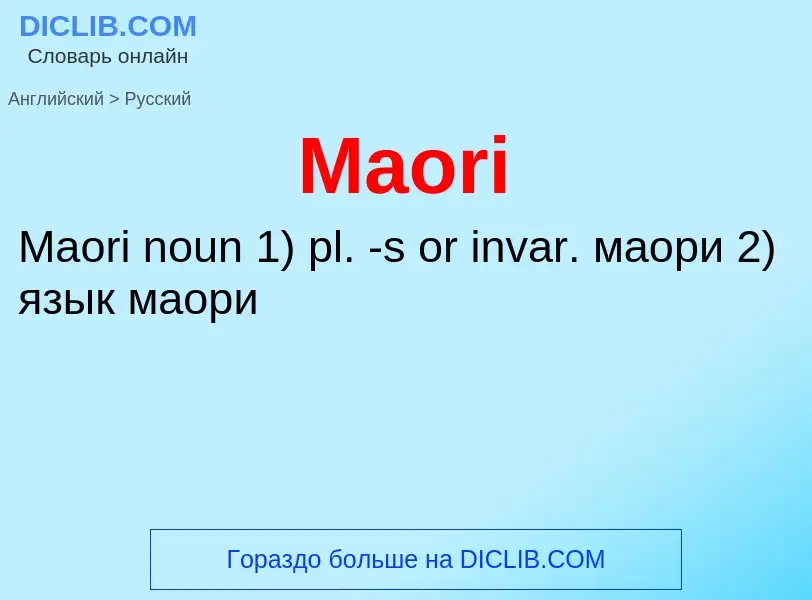Translation and analysis of words by ChatGPT artificial intelligence
On this page you can get a detailed analysis of a word or phrase, produced by the best artificial intelligence technology to date:
- how the word is used
- frequency of use
- it is used more often in oral or written speech
- word translation options
- usage examples (several phrases with translation)
- etymology
Maori - translation to English
['mauri'mɑ:ri]
существительное
общая лексика
маори
язык маори
зоология
маори (Ophthalmolepis lineolatus)
общая лексика
синяя нототения (Paranotothenia)
Definition
Wikipedia
Māori (Māori: [ˈmaːɔɾi] (listen)), or te reo Māori ('the Māori language'), also known as te reo ('the language'), is an Eastern Polynesian language spoken by the Māori people, the indigenous population of mainland New Zealand. Closely related to Cook Islands Māori, Tuamotuan, and Tahitian, it gained recognition as one of New Zealand's official languages in 1987. The number of speakers of the language has declined sharply since 1945, but a Māori-language revitalisation effort has slowed the decline.
The 2018 New Zealand census reported that about 186,000 people, or 4.0% of the New Zealand population, could hold a conversation in Māori about everyday things. As of 2015, 55% of Māori adults reported some knowledge of the language; of these, 64% use Māori at home and around 50,000 people can speak the language "very well" or "well".
The Māori language did not have an indigenous writing system. Missionaries arriving from about 1814, such as Thomas Kendall, learned to speak Māori, and introduced the Latin alphabet. In 1817, Tītore and his junior relative, Tui, sailed to England. They visited Professor Samuel Lee at the University of Cambridge and assisted him in the preparation of a grammar and vocabulary of Māori. Thomas Kendall travelled to London with Hongi Hika and Waikato (a lower-ranking Ngāpuhi chief) in 1820, during which time further work was done with Professor Lee, who gave phonetic spellings to a written form of the language, which resulted in a definitive orthography based on North Island usage. By 1830, the Church Missionary Society (CMS) missionaries had revised the orthography for writing the Māori language; for example, Kiddeekiddee became, as in the modern spelling, Kerikeri.
Māori distinguishes between long and short vowels; modern written texts and those designed for standard use usually mark the long vowels with a macron. However, some iwi, such as those within the Tainui confederation of the Waikato, represent long vowels with double letters (for example: Maaori rather than Māori). This was the standard for older romanisation. For modern exceptions see § Long vowels below.

![[[Bastion Point]] land rights activists with Māori-language signs [[Bastion Point]] land rights activists with Māori-language signs](https://commons.wikimedia.org/wiki/Special:FilePath/Bastion Point Maori Land Rights copy.jpg?width=200)

![Bishop of Waiapu]] Bishop of Waiapu]]](https://commons.wikimedia.org/wiki/Special:FilePath/First Lessons in the Maori Language, title page 1862.jpeg?width=200)



.gif?width=200)
